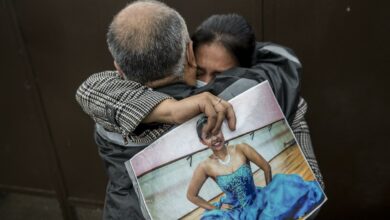Cuban trans protester Brenda Diaz imprisoned with men

By Juan Carlos Espinosa
Havana, Jul 19 (EFE).- Ana Maria’s face changes quickly from complete seriousness to a wide smile when the cellphone rings and she discovers that it’s Brenda on the line.
Her trans daughter – a sexual orientation option that is not incorporated into Cuban law – is incarcerated in the men’s section of a prison for participating in the July 11, 2021, anti-government protests.
“Hello, darling!” Ana Maria cries, waiting at a “guagua” (bus) stop in Havana dressed in a white t-shirt bearing the image of her 28-year-old daughter and the word “Libertad” (Freedom).
Brenda Duaz is serving a 14-year prison sentence in the town of Guines, in western Mayabeque province. It’s a special penitentiary – with separate sections for men and women – for people with the HIV virus, like her.
Although in prison retroviral treatment has never been lacking – that being a basic element in treating HIV-positive people – Ana Maria must take her daughter the other medications she needs for chronic gastritis and kidney issues which are not available in prison, she told EFE in an interview.
“Before, I saw her every two weeks, but now they’ve changed the (prison) directives and I won’t be able to visit her until the end of the month,” Ana Maria said bitterly. The last time she saw her daughter was on July 5.
A municipal court convicted Brenda last March for the crimes of public disorder and sabotage, according to which she received her sentence, to which EFE gained access.
Diaz was arrested along with her 16-year-old brother Luis Manuel, who tried to prevent the police from seizing her. The teen was released after 17 days in custody upon payment of a fine of 1,000 Cuban pesos ($41.60 at the official exchange rate).
The sentencing document states that Brenda threw stones at one of the controversial currency exchange offices in her town of Guira de Melena, 40 kilometers (25 miles) southwest of the capital, entered the establishment with a group of protesters and stole a “wall fan, a pressure cooker and a box of candy.”
According to the prosecution’s written accusation, police confiscated the flowered dress that Brenda – who was tried as a man and under her legal name, Freddy Luis – was wearing when she participated in the march.
Once she was in prison, her head was shaved and she was interned in the men’s section. Her hair, which had been her pride and joy, vanished in a few minutes and that caused her to become severely depressed, her mother said.
Ana Maria provided the details of the case with a stoicism that was only interrupted when she began to tell how her daughter had been sexually attacked inside the prison.
In a halting voice reflecting a mixture of rage and sadness, she said that “At times I can’t even speak about that … She’s my life. Despite her illnesses, despite everything. I still can’t get over the fact that she’s locked up.”
Her daughter’s sentence, however, is not fixed and on June 17 a cassation hearing was held whereby her sentence may ultimately be reduced or nullified altogether. Ana Maria hopes that Brenda’s sentence might be overturned or that she can serve it outside of prison, for instance.
So far, the family has received no notification from the court.
The Cuban Public Ministry through June 22 had reported handing down sentences against 488 of the “11J” demonstrators ranging up to 25 years behind bars for crimes such as sedition, public disorder, assault and contempt for government regulations.
In the accusation against Brenda, the Prosecutor’s Office gathered data that trans journalist and activist Mel Herrera says are “revictimizing” and “stigmatizing.”
For example, in the written accusation it is emphasized that Diaz wore a dress, is HIV-positive and confuses her gender identity with “sexual orientation.”
“The way she dresses has nothing to do with what she was on trial for. There was no weapon, there was no conclusive evidence. That dress, in mentioning it, simply reveals a prejudice because the state is wanting to say that that person was wearing a disguise,” complained Herrera in a telephone interview.





